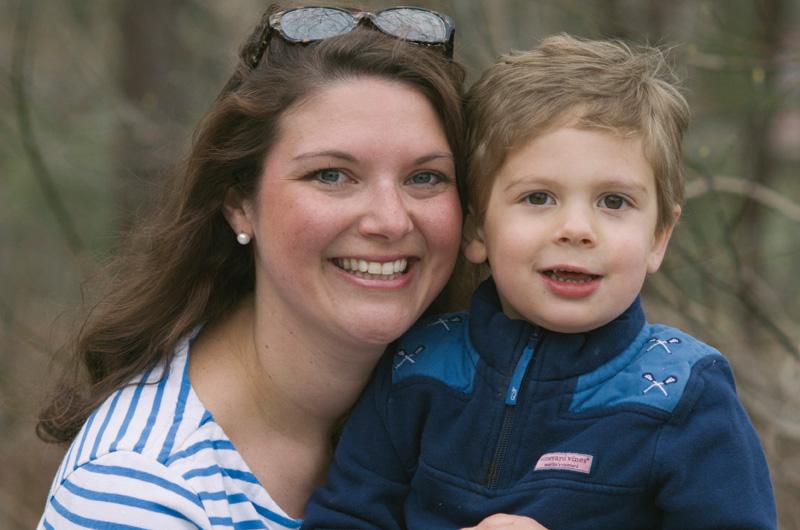This is a story about mothers. It starts with an instinct that something’s not right with her child. This isn’t about whether he’s one month behind in talking or potty training. This is about a child who may not allow his mother to console him. Or who lashes out because he can’t communicate his needs. Or who isolates himself. Is this a child who’s simply quirky, or is there something profoundly out of place?
And so the search begins, often starting mother to mother between women who somehow find one another for solace and information. “There was a generation of parents above us,” says Kate DeVane of West Tisbury, whose autistic child Mark is eleven. “I know a lot about autism and ninety percent of what I know, I learned from other parents who were ten years ahead of me. It’s like passing the baton.”
In the case of the Island Autism Group (IAG), it’s the story of two mothers, DeVane and Marcy Bettencourt of Oak Bluffs, who, once connected, quickly identified service gaps on the Vineyard and made a plan. A grand plan, it turns out, to do something lasting for the one in forty-five school-aged children with autism on the Island and their families. Almost a decade ago, the two women, who met through the Project Headway preschool, began supporting
and augmenting what the Island schools were offering to students. Today, the organization they helped found provides all the extracurricular activities on the Island for children with autism, as well as therapeutic riding, sensory camp, iPads, and other technology that
assists children on the spectrum.
Much has been accomplished, in other words. But to parents of autistic children, the calendar might as well be a ticking clock, because at age twenty-two the existing educational support system must, by law, come to an end. Which is why IAG is pursuing an ambitious new goal: to acquire land and build a center to serve as a hub for after-school programs, a family summer camp, job training, expert lectures, a community space, and much, much more.

Vineyard Haven mother Connie Berry knows firsthand how urgent the need for such continuing support can be. Her son Dan Meaney turned twenty-two in May and his day-to-day life immediately changed. “The school doesn’t have staff in place to help these kids to transition,” says Berry. “They take kids out to different job sites, but then at twenty-two they’re gone. There’s not a bridge, and part of our struggle as parents is to make that happen ourselves.”
That Dan has a solid plan in place has everything to do with Berry’s constant advocacy, from asking Dan’s friends and teachers what he likes to do (“Apparently he’s great at frisbee. Who knew?”), to working with the state Department of Developmental Services, which will fund a thirty-hour-week support person beginning July 1.
Phone calls, endless forms, trips off-Island, and logistical challenges have been much more doable because of the Island community that has embraced and supported Dan and his family.
“I’m happy if he’s happy,” says Berry, who arrived here four years ago from Syracuse, New York, and is a relatively new member of IAG. “It’s been a life-changer. The community plays an enormous role in Dan’s life. He’s embraced here and there’s been a ripple effect in the way he touches people’s lives.”
“Autism is not a death sentence, but it is a life sentence,” says DeVane, “and these young people need to be integrated into the community where they can function as adults and make a contribution.”
For Brooke and Derek Avakian of Edgartown, IAG became one of their lifelines. The young couple’s love story is a familiar one here – meeting in college and then returning to the Vineyard, where Derek was raised and where he joined his father’s construction business. The life they were imagining and planning for on the Island changed, however, in July 2015 when their now three-year-old son, Cooper, was initially diagnosed with autism. Getting and then reconfirming the diagnosis involved multiple trips off-Island to see various doctors and therapists – a considerable cost, even beyond the emotional toll, that was partially relieved by Martha’s Vineyard Community Services Family Support Center, which was where Brooke first turned for help.
After Cooper’s diagnosis was confirmed, there were some particularly bleak weeks when Brooke was determined to leave the Island to ensure that her son could access the specialized attention and services he requires. Eventually, though, with the ongoing good counsel of the folks at the Family Support Center, she made her way to IAG and to Project Headway, where Cooper is now enrolled.
“It’s been amazing. His confidence is up, he’s happy,” says Avakian. “He’s the youngest at the school and everyone knows and loves Cooper and that makes him part of the community at the Oak Bluffs School.”
Cooper’s two-year-old sister Lillian, meanwhile, is devoted to him. She is also, incidentally, precocious at language – her older brother’s major challenge – in part because she’s had the offshoot benefit of therapists who come to work with Cooper.
Because autism affects entire families, the center that DeVane and her fellow IAG board members envision would also serve siblings, who perhaps can’t have friends stay overnight because of their autistic brother or sister. Or who must develop a certain independence at a young age because, well, because their parents are overwhelmed.
It won’t be cheap – three to five million dollars. But with a lack of family respite camps that specifically address kids on the autism spectrum, DeVane’s team believes the Vineyard center would be a draw to off-Island families as well, making it eventually self-sustaining. Until then, as the mothers began, so they continue – identifying the gaps, working to fill them in an Island community, and always, always advocating for their kids.
For more information, go to islandautism.org.



 1 comment
1 comment
Comments (1)